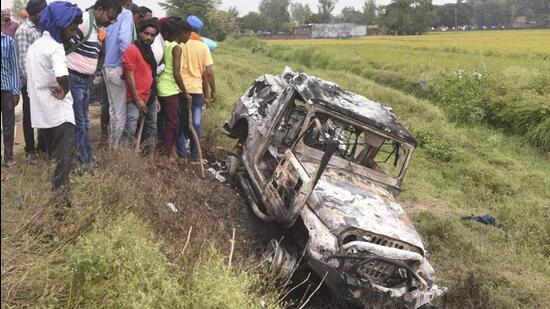Notices served on plea against bail to Ashish Mishra in Lakhimpur Kheri case
A bench, headed by Chief Justice of India NV Ramana, issued notices on the plea filed by the families of three of the victims who were mowed down by a convoy of cars on October 3, 2021.
The Supreme Court on Wednesday issued notices to the Uttar Pradesh government and Ashish Mishra -- the son of Union minister of state Ajay Kumar Mishra -- on a petition challenging the bail granted to him in the Lakhimpur Kheri violence case.

The top court also asked the state government to ensure the protection of witnesses in the matter.
A bench, headed by Chief Justice of India NV Ramana, issued notices on the plea filed by the families of three of the victims who were mowed down by a convoy of cars during a farmers’ protest against the now-repealed farm laws on October 3, 2021. In all, four farmers and a journalist were crushed under the wheels and in subsequent violence, three others were killed. One of the cars in the convoy belonged to Ashish Mishra.
During Wednesday’s hearing, the bench, which also comprised justices Surya Kant and Hima Kohli, also took note of a complaint made by the families’ lawyer Dushyant Dave regarding an alleged attack on one of the chief witnesses in the case.
“While the state has chosen not to challenge the grant of bail to the main accused in the case (Ashish), a protected witness under the orders of this court has been attacked,” lamented the senior counsel.
Arguing against the bail granted to Mishra by the Allahabad high court last month, Dave emphasised that the court completely overlooked the fact that the Supreme Court took suo motu cognizance of the matter in October 2021 owing to its seriousness.
At this, the court said that it would seek an explanation from the state government on all the aspects. Advocate Ruchira Goel, who was appearing for the Uttar Pradesh government in the case, asked for some time to get suitable instructions.
Also Read | Lakhimpur Kheri UP Election Result 2022: BJP wins all 8 seats
“What instructions? You must file a detailed affidavit on this petition and you also see that witnesses are protected. Make sure of that,” the bench told Goel.
The court then gave Mishra and the state government a week’s time to file counter affidavits and fixed the case for hearing next on March 24.
The plea seeking cancellation of Mishra’s bail has been filed by Jagjeet Singh, Pawan Kashyap and Sukhwinder Singh – family members of three of the victims. Mishra was arrested on October 9 after the top court reproached the state government for the way it handled the investigation in the case.
In their petition, the victim’s kin feared that the witnesses in the case would be intimidated as the accused is influential. They rued that the bail order did not consider the heinous nature of the crime, the overwhelming evidence against the accused in the charge sheet, the likelihood of the accused fleeing from justice, and the possibility of his tampering with evidence or influencing witnesses.
The plea further questioned the inferences drawn by the high court saying, “There might be a possibility that the driver tried to speed up the vehicle to save himself, on account of which, the incident had taken place.”
It pointed out that the high court erroneously relied on the first information report instead of the charge sheet which clearly mentioned that the cars involved in the incident were driven at speed of 70-100 kmph as it approached the protesting farmers.
In November last year, the top court appointed retired Punjab and Haryana high court judge Rakesh Kumar Jain to monitor the probe into the case, underscoring that the appointment of a former judge from outside Uttar Pradesh would “ensure transparency, fairness and absolute impartiality in the outcome of the investigation”.
It had also ordered a new special investigation team (SIT) to probe the violence and inducted three Indian Police Service (IPS) officers in the team, asking them to complete the investigation “expeditiously” and in a time-bound manner, and by using latest forensic investigative methods “to reach the truth”.
In its orders in October and November 2021, the apex court had also directed the state government to ascertain that witnesses are kept out of harm’s way.






